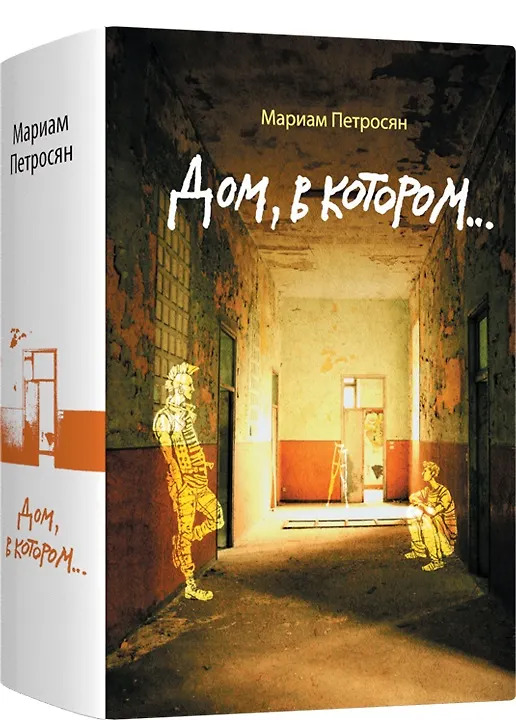An open book: how do homeowners differ from PMCs "Redan" and quadrobers

The subculture, which is called the domovtsy, has recently been widely discussed on the Internet. Her supporters are readers of Mariam Petrosyan's novel "The House in which." This community has been around for a decade and a half. It differs from many other informal associations primarily in that it is based on a hobby that is not the most popular among teenagers these days — the love of reading. Who are homeowners, why they are offended by the comparison with Redan and quadrobers, and whether it is possible to get obsessed with books — in the Izvestia material.
Money changers and nights of fairy tales
The novel's plot, which became the basis for the emergence of a new subculture, focuses on the life stories of boarding school students for children with special needs. The fictional world with its traditions and mysterious collisions appealed to teenagers and young people — the age of community members ranges from 12 to 25 years.
Mariam Petrosyan, the author of the book, considers the concept of "subculture" not to be an accurate definition for homeowners.

"It's more like a community or an interest club," says the writer. — The children are brought together by their love for a particular book, but later they discover that they are united by other interests. I treat them with understanding and sympathy. In my youth, it was also my habit to catch fire with books and look for like-minded people who share this passion. However, I didn't find them — before the advent of social media, it was much more difficult.
According to Petrosyan, teenagers like to mark their belonging to a group with bright markers. At the same time, according to the writer, this does not greatly affect their lifestyle outside the group.
Daria Serebryakova, a clinical psychologist and deputy head of the rehabilitation program at Dr. Isaev's Clinic, notes that belonging to a group is one of the basic psychological needs of a person.
—Aristotle also formulated one of the basic tenets of psychology: man is a social being,— says Serebryakova. — And since we are social beings, we certainly need other people. The need to belong to a group is important to us. Of course, there are people who are less social and more inclined to individualism. But the majority still feel this need.
From the point of view of a clinical psychologist, the subculture of homeowners is rather an intellectual, creative environment. If a teenager reads, develops imagination, fantasizes, finds friends in this circle, then this is useful. The main thing is that the hobby does not negate other areas of life, warns Daria Serebryakova.
A clinical psychologist points out that in adolescence, the first separation from the family begins. A teenager realizes that the world is not limited to home, discovers new rules for himself, begins to identify with external social groups, look for his place and form an identity.
— Personality is always built around identity: "who am I," "what are my views," "which group do I belong to," "what is my path," explains the clinical psychologist. — The search for identity through subculture is an absolutely normal stage of development.
The clinical psychologist emphasizes that almost everyone needs to belong to a group of like-minded people.
"But how it is implemented depends on the individual, the environment, the available resources and the level of development,— says Daria Serebryakova. — There are more difficult ways, for example through sports, science, creativity, early professional vocation, volunteering. There are also easy ones when you can "do nothing" but be accepted in your environment.
According to Serebryakova, in general, almost everyone initiates through subcultures — it helps to form an identity.
"A healthy scenario is when, after passing through this stage, a person becomes a more independent and mature person,— comments Daria Serebryakova.
Geeks and fanfiction
A representative of the domovtsy, who identified herself in an interview with Izvestia, L.E., explains that the book attracts young people primarily because it is about teenagers and for teenagers. The novel is full of mysteries, bright colors and fantasy elements, but it is written in a simple language that everyone understands, the reader emphasizes.
— The topics revealed on the pages of the book are often close to teenagers. These are problems of acceptance by others, fear of the unknown and adulthood, an anxious expectation of change and the need to make a choice. Readers come together in one community and help each other in solving these difficulties. They create a comfortable environment for themselves, in which it's not scary to be themselves and in which it's easy to find friends," says the girl.
L.E., like the author of the novel, believes that homeowners cannot be called a subculture.
— House owners do not have any common idea, a common way of thinking, like hippies or punks, they do not have their own special value system, - comments L.E. — Despite the fact that representatives of the community often have the same tastes in music or clothing, there is also no "own" genre or style and attributes.
There are things in the book that the author would not recommend imitating. But the homeowners themselves emphasize that they are not trying to recreate what is happening in the novel, but rather choose the creative component and communication. According to L.E., homeowners are more like Tolkienists or Potteromaniacs, only the format of meetings is different. They gather for so—called swap Tuesdays, meetings where they trade various things for each other. The house owners, like the heroes of the novel, organize "fairy tale nights", publish magazines, and are fascinated by fanart and fanfiction (new stories based on their favorite plot).
— I saw online crafts for changing Tuesdays, — says the author. — Some products are simply amazing. And the fanart of the book's fans was used to illustrate the gift edition.
One of the distinguishing features of homeowners is the obligatory presence of a nickname. According to the clinical psychologist, in adolescence, this practice usually reflects the process of identity formation. It's a way to try yourself in different roles, establish new social connections, and be accepted in a group. If there is no aggression, violence, or marginalization behind this, then this does not cause concern.
According to a homeowner from Chelyabinsk named Mutny, in their environment nicknames act as a kind of protection.
"The safety of personal data is more relevant than ever, and sometimes you only want to reveal your real name and surname to someone you already trust," comments a community representative. — In addition, nicknames simplify identification. When you call Dasha or Kirill, a dozen people will respond. And there are much fewer Malvins and Watchmakers — it's immediately clear who we are talking about.
Since the characters in the novel are children from a specialized boarding school, Mariam Petrosyan emphasizes that the opinion of people with disabilities is very important to her. And readers believe that interest in the novel can even positively influence the attitude towards such people in society.
— I would like to believe it, — the author comments. — There was no criticism from people with disabilities. They like the book. There may be opponents, but I've never met anyone like them.
Far from quadrobers
Representatives of the community claim that they are far from aggression.: they do not fight wall to wall and do not divide territories, which is sometimes attributed to them, confusing them with other subcultures.
— Recently, the Internet has suddenly drawn attention to homeowners, and people have a rather superficial, partly even erroneous idea of the community, — Mutny comments. He joined the movement as a teenager 12 years ago. — We are put on a par with rednecks and quadrobers, many young homeowners feel uneasy about this, and as a representative of the older generation, I am ready to protect them.
From his point of view, homeowners are an inherently harmless community of geeks (people who are passionate about something) who love books, comics, anime, movies, TV series and music. Mutny also notes that the representatives of the community do not have a single attribute, although iconic symbols from the book are used. According to L.E., homeowners express themselves in everything from the style of clothing to the manner of speech. This is probably due to the fact that there are many characters in the novel with different fates, views and behaviors, and readers look at the world in different ways.
"We don't have a single philosophy, everyone is free to interpret the book in their own way," Mutny continues. — Homeowners often act as volunteers and organize interesting cultural events. Moreover, the average age of homeowners is usually higher than that of the same quadrobers — there are many children around 16 years old among the fans of the book. The older generation also likes it, including pensioners.,
The majority of homeowners are still teenagers. According to Mutny, the book "The House in which ..." is dedicated specifically to the problems of growing up.
— Many thoughts are not presented there directly. Some people may be confused by a certain mysticism, but such a book should not be taken literally. This is a book about how children are afraid of becoming adults and why they are afraid. And also that you have to grow up and it's better not to run away from it, so that you can help the next generation to be less afraid," Mutny sums up.
Representatives of the community, growing up, choose mainly creative professions, comments the Chelyabinsk resident.
— Among them are artists, poets, musicians, architects and sculptors, craftsmen. There are also people who choose the path of teachers, doctors and programmers. All of these are reading, thinking, and highly interesting people, or those who are still on their way to becoming such," Mutny notes.
Is it possible to go crazy because of a book
Most parents are skeptical about their children's hobbies at some point, believing that minors become dependent on their hobbies. Even the love of teenagers for a cult novel may seem strange to some adults.
The clinical psychologist draws attention to the fact that the love of reading cannot be called an addiction — it is rather a hobby, a passion. Parents should sound the alarm if they notice sleep disorders, appetite, emotional disorders, depression, apathy, isolation in children. But the clinical psychologist does not associate such conditions with reading books, believing that most often there is a deeper reason behind this, which it is important to recognize in time.
— Addiction is something that has negative consequences for adaptation. If a person is passionate about something, but at the same time gets an education, finds a profession, and develops, then even if it takes up all their free time, we don't call it addiction," explains Serebryakova.
One should be wary when it comes to reading exclusively monotonous literature. And if at the same time a person refuses to do everyday things, loses contact with reality, this is a reason to seek the help of specialists.
— For example, in the early stages of schizophrenia, so-called metaphysical intoxication is possible: a person suddenly goes into philosophy or religion, but does not go to study at a seminary or university, but simply endlessly argues, argues, loses contact with others and falls out of life. Then it's not even an addiction anymore, but a pathological hobby," Serebryakova comments.
Self-isolation, withdrawal from reality, and rejection of other spheres of life indicate that any hobby that a person is obsessed with is no longer a good thing, but a deviation from the norm. And the reason for this is not reading or watching movies, but the initial psychological vulnerability — infantilism, developmental disorders or incipient mental disorder, the expert concludes.
Переведено сервисом «Яндекс Переводчик»









